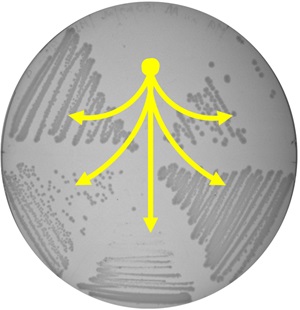Genetic selections for protein folding
Genetic selections are powerful tools that allow us to observe rare biological events and solve difficult problems. Our lab links selectable phenotypes to protein folding, protein solubility, and protein interaction events. Utilizing plasmid genomic DNA libraries from diverse organisms and the environment, we can discover uncharacterized protein folding factors, and use them to improve recombinant protein expression in E. coli.
A summary of our newest genetic explorations:
a) Discovery of novel folding factors for a given protein, by linking protein folding to antibiotic resistance
b) Engineering of mutant proteins with increased solubility
c) Identification of protein interaction partners using plasmid libraries
d) Selection of enzymes which modify the redox state of methionine

The Berkmen lab uses bacterial genetic selections to identify novel enzymes and robust solutions to difficult protein-folding problems.
In this image, minimal agar plate with oxidized methionine sulfoxide (MSO) as the sole methionine source is used to discover enzymes that modify the redox state of methionine. E. coli cells lacking a functional methionine sulfoxide reductase (Msr) do not grow (top sector). Genetic selections using genomic plasmid libraries has resulted in identification of various Msr’s with different levels of redox activity.

